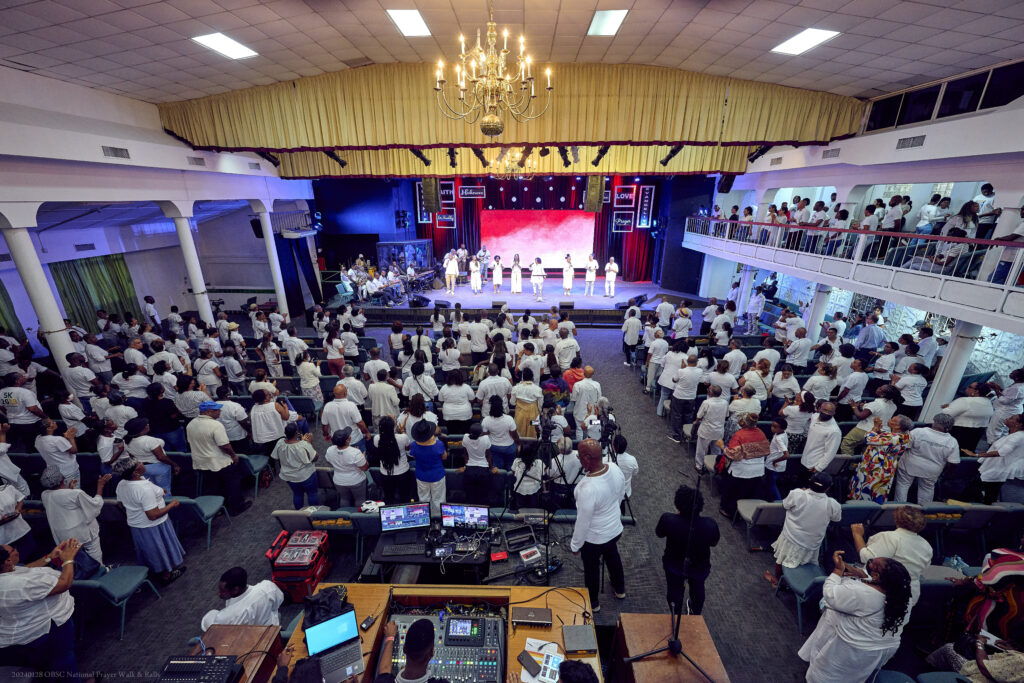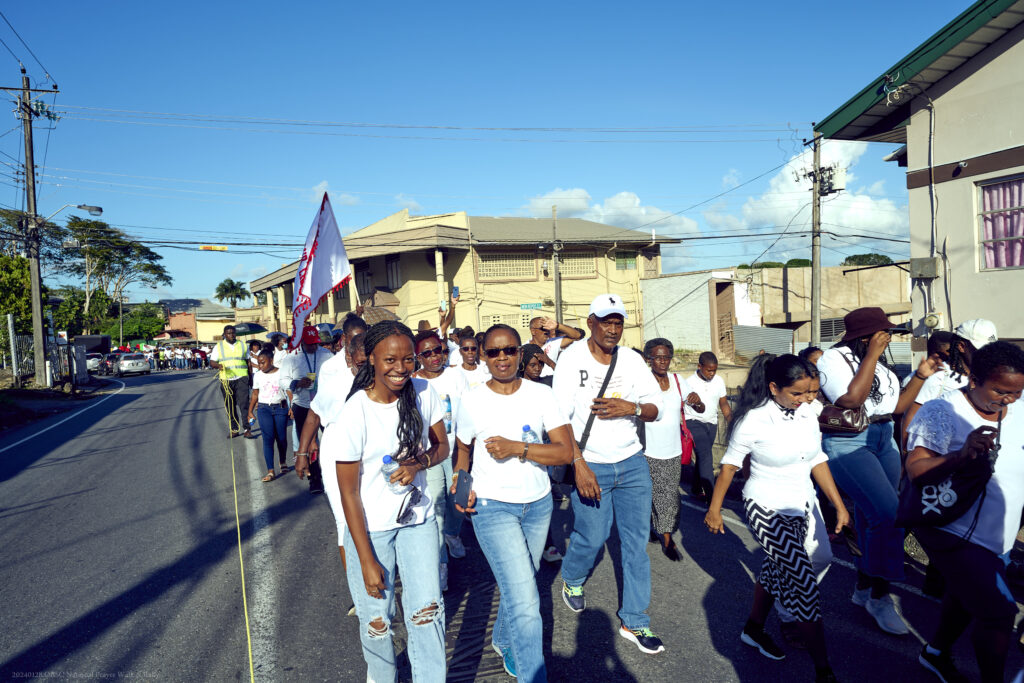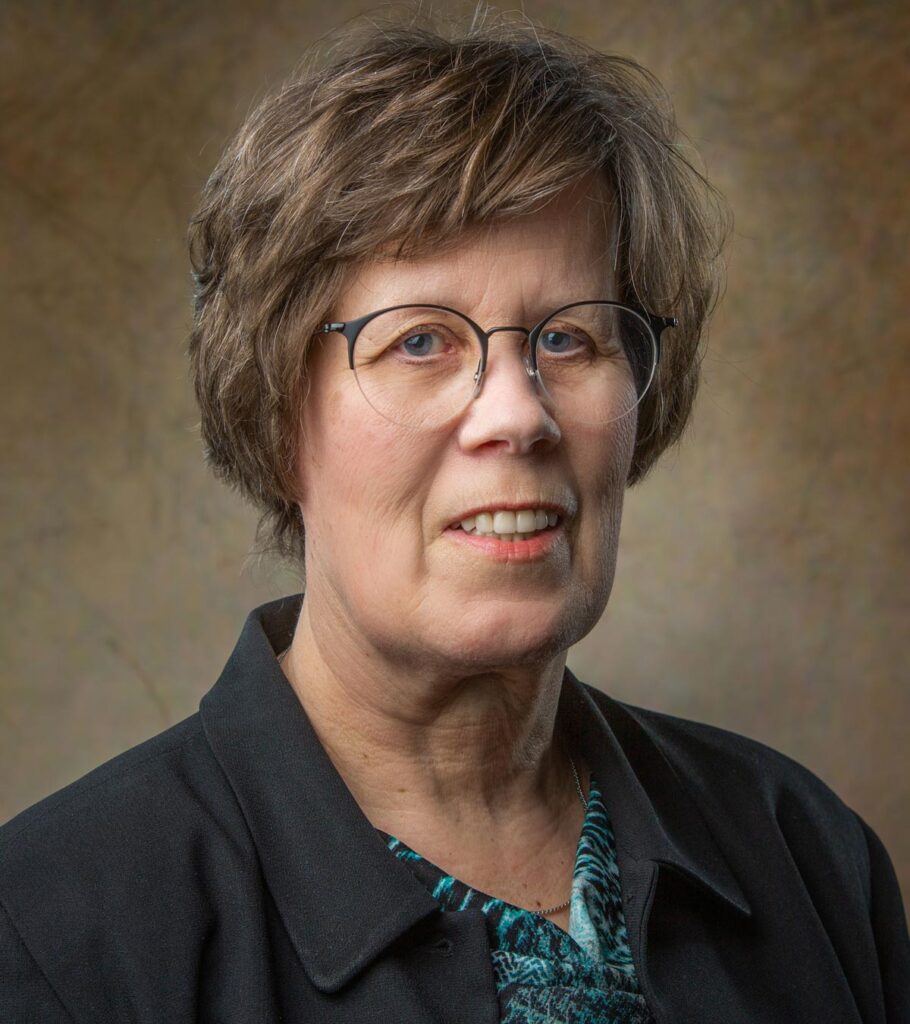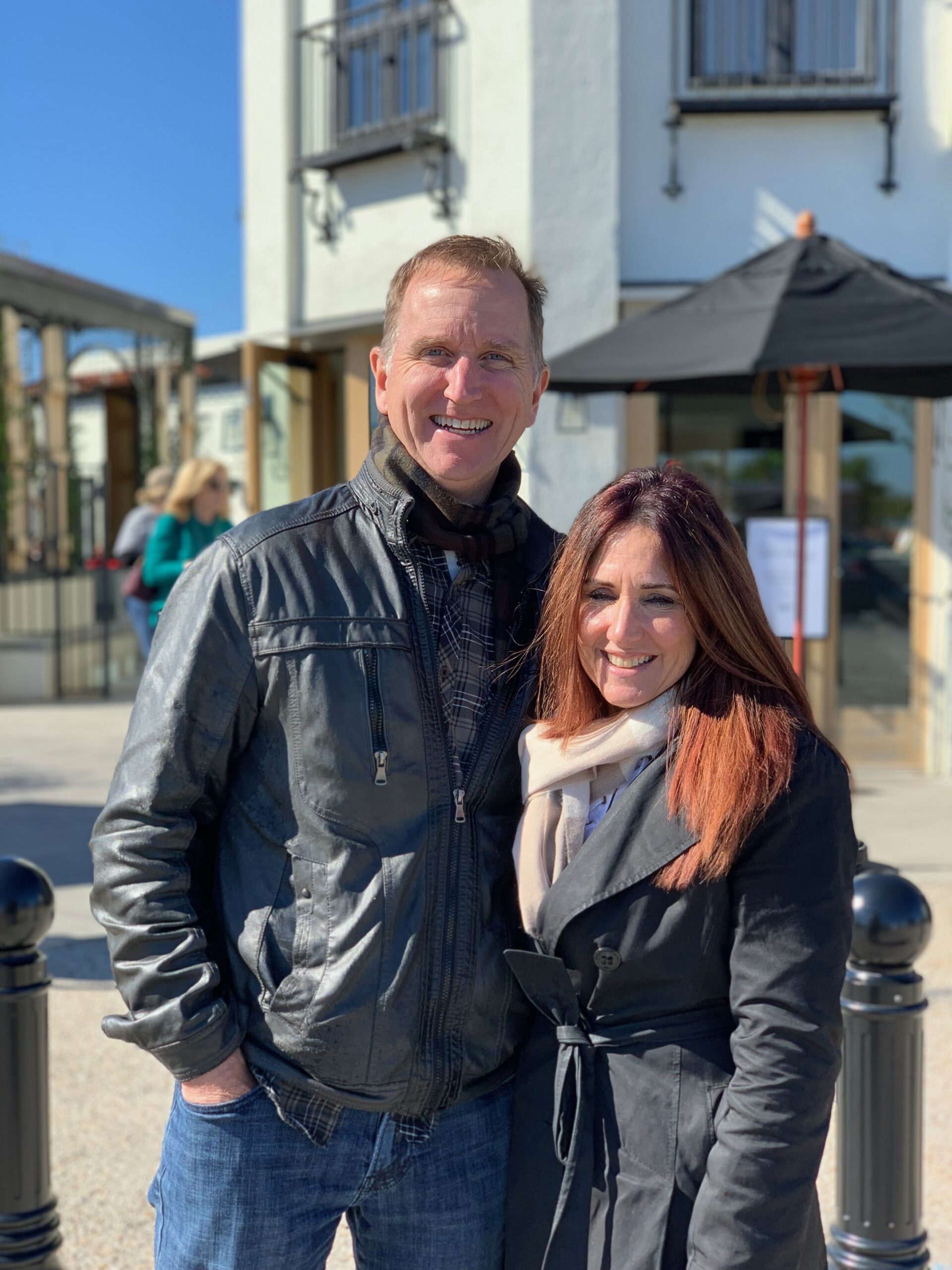Featured Articles
Blind Faith – Interview with Gary and Joneile Emery
Published
4 years agoon


How would you react if you suddenly went blind? In this interview we are talking to Gary Emery, who lost his sight about four months ago, and his wife, Joneile. Gary serves as the regional executive director for Open Bible’s Pacific region. Joneile is an artist and also serves in many facets of regional ministry.
Message: Gary, describe the morning you first lost your sight.
Gary: It really happened in two phases. In 2014 I was doing our regional conference in Spokane. I didn’t understand what was going on at first as I was having difficulty seeing, but my left eye had gone blind during the night. I kind of stumbled through the rest of the conference, got home, and found out that my optic nerve in that eye had died. A specialist told me that one out of five people who experience this type of loss would eventually lose sight in the other eye. After about a year I felt like I had dodged that bullet, but in October of 2019 I was returning from a missions trip to Costa Rica and noticed everything was going dark in the airplane. Within a day I was meeting with the specialist again, and he confirmed the optic nerve in my right eye was gone.
Message: What went through your mind when it first dawned on you that your sight was mostly gone?
Gary: At first it felt as if I would wake up and realize I had experienced a bad dream, but then you realize it is real. Outside a miracle, this is permanent.

It’s been four months now. A couple things help: first, the grace of God and great support from my wife and friends. You realize that although this is the “rest of your life,” you really live only one day . . . and then you live the next day. That old phrase “one day at a time” is really true. I would think, “I don’t know if I can bear this the rest of my life, but I can bear it today.” The second thing is that years ago I learned how our emotions are formed and how to change our emotions. Because of that and by God’s grace, I haven’t gone into a depression hole. If someone had told me years ago this would happen, I think I would have curled up into a fetal position.
Message: What do you mean you can change your emotions?
Gary: Emotions are not created by our circumstances. We get a scary diagnosis or a letter in the mail or we lose our job. We think the event created the emotion, but it is not true. It’s not the event but what we believe at that moment that creates the emotion. So there is the event, and then there is the belief we have about that event, and then there is the emotion. If I have the belief that my life as a blind person is going to be horrible and there are no good times ahead and I have nothing to offer the Kingdom, that’s what creates the depressed emotion. Instead I can face it and say, “This is a hard thing, but I have been through other hard things, and God will be there with us and He will give us opportunities to make a difference for Him in other ways like we haven’t before, and we are going to have a great life!” I have to contend for that. But that belief is what creates the emotion.
Joneile: When this happened, we held each other and made a pact to remember that this has not changed who God is or who we are. We are going to take advantage of the things we like to do. We are going to enjoy life. People go through worse things than this. It is tragic. But if you treat it as “this is going to ruin my life,” then you will miss every good thing that comes from just being alive and being together. We’re not buying that. We are going to cling to each other and cling to the Lord and anticipate all the good things we are going to experience together.
Gary: Outside of a miracle (which we’re praying for) this is it; there is no medical cure. We believe in miracles, but we are not going to wait for one.
Joneile: We also believe that this could be one of the best testimonies ever because Gary’s case has been so documented; his optic nerves are dead. Imagine if the Lord chooses to heal that…!
Message: Joneile, you and Gary are both pretty independent and lead busy lives. How has this situation changed your life? Your relationship?
Joneile: Gary and I were best friends before we felt romantic about each other and got married. He’s the person I would most rather spend time with than anyone on the planet. The good thing is that this has thrust us together; we are more of a team. Of course, there’s a downside. He can’t drive. There are inconveniences that come with that. But I’m less ambitious at this age about chasing every opportunity and more excited about being home with our routine.
And he has family. I could call his sister who lives in California, and she would gladly come up for a week. Lots of friends, lots of men pastors would love to spend time with him. I don’t feel boxed in.
Gary: I don’t know what people would do if they had a bad marriage and something like this would happen.
Joneile (laughing): It’s a good thing we like each other.
Message: Gary, how do you cope with what I would think must be an increased sense of dependence?
It’s been four months now. A couple things help: first, the grace of God and great support from my wife and friends. You realize that although this is the “rest of your life,” you really live only one day . . . and then you live the next day. That old phrase “one day at a time” is really true. I would think, “I don’t know if I can bear this the rest of my life, but I can bear it today.”
Gary: It’s hard because I have run at a fast pace my entire life. I multitask pretty well. One thing in addition to the dependence factor is that my pace just has to be slower because I do need other people to do certain things for me. Even just walking through a room . . . if I walk too fast, I will trip over something. That’s frustrating. You try to do as many things for yourself as you can, and every day gets a little better. Early on I would try to help with dishes or brew coffee and would drop something or spill something and end up making a bigger mess. But you have to keep trying. You have to keep making messes if you’re going to get on the other side of this. There are some things I can’t do at all, but I’m trying every day to do one new thing.
Joneile: The Oregon Commission for the Blind has assigned him two trainers. One is a mobility coach that helps him with things like getting up the stairs to go work out and walking with a cane. But training comes one piece at a time and you still must live your life, so he’s in the midst of it. I would guess it will take a year before he becomes proficient. The other coach they assigned him is a technology coach. He is training him how to navigate with an iPhone. Every iPhone has “VoiceOver” technology, so if you can’t see the screen, you can still operate the phone. However, it is very complicated.
At work his staff has helped so much. It’s hard for him because if one of us at the office is helping him, he knows we aren’t getting our other stuff done.
Message: Joneile, have these circumstances changed your sense of security, and if so, how?
Joneile: I depended on Gary to kill spiders and get up in the night when I heard a sound. Just last night the security system alarm at the office went off, and we got dressed and went to check on it. We are willing ourselves to trust God and not be afraid.
Gary can talk me through a lot of things he would have done. But there is a whole rack of stuff you don’t realize your husband does, like when we travel. So we get the rental car and guess who’s driving downtown everywhere – all over L.A. and other places I’ve never been? It’s me! I’ve had to pull up my courage a bit, and I’ve had to say to the Lord, “Cover us.” We do get through it, but it does feel a little weird.
The reality is, our husbands can only protect us to a point. There are few things in life you really have control over. We’ll do the best we can and trust God for what is deficient. We do have people around us. Our nephew lives in an apartment under our house and our son is near us.
Message: It’s fun to see people who have been together as partners and see how their relationship grows even stronger through something like this.

Joneile: I think when people see a Christian suffer, someone who loves God and is committed to Him, there is a beauty to that. It’s hard for people to look away from it. It’s counterintuitive that you thank God for every day even though it’s so altered. When we apprehend everything we’ve ever taught about what the Bible says, about who God is and how we serve Him, that this is the short life and we are servants of another kingdom, we can trust that God brings joy in that. People that know God know that He died to give us peace, joy – to fill our lives with what it means to be near Him and how good that is – and that is enough. We in America don’t know what’s it’s like to be stripped of stuff, but when you are stripped of things that are crucial to you, He is still enough, and more than enough. That is a testimony that nobody can take away.
Gary: We would love to have a miracle. But our faith isn’t in that. Our faith isn’t in getting what we want. That’s a shallow, thin, and misdirected faith. Our faith is in the Lord. The three Hebrew children said, “Our God is able to deliver us from this fire, but even if He does not . . . we’re not bowing down to you.” That’s faith in God irrespective of results. We don’t want to have “results faith” but “regardless faith.”
Message: Gary, you said that asking the “why” questions doesn’t help. Could you unpack that a bit?
Gary: The why questions are going to come, usually for me in the middle of the night or early in the morning. Here’s the thing with asking why: Those answers are not things that you can apprehend or pry out of something . . . and when you try to do it you will probably end up with the wrong answer. Instead, what we are trying to do is focus on the “what.” God, what do we do now? There is plenty we need to deal with right now, so we say, “What do we need to do in this moment?” That’s enough. If I need to know why, I will know. There could be mysteries we will never know.
Joneile: There is mystery in suffering. Some of the why questions will be answered on this side, but most won’t. We can concoct answers, but then can be like Job’s comforters.
Gary: Knowing the answer to a why question doesn’t get you anywhere anyway. So what if we know why. You still have to move through your day and figure out how to do life.
Message: Gary, we know your faith, your sense of humor, and your amazing wife and colleagues have been a huge help to you. What could the average person you encounter do to help you?
Gary: The greatest value of using my cane is that it says to people around me, “This guy can’t see.” I’ll be moving through an airport and people will see me struggling to find something and come up and say, “May I help you?” Just ask first. My mobility coach told me a story of being in San Jose. He needed to cross the street and some guy who spoke a different language grabbed him by the back of the shirt. The guy then semi-dragged my poor coach across the street all the time speaking a different language. My coach couldn’t help but wonder if he was being kidnapped! Simply ask if you can help. People are extraordinarily kind.
The why questions are going to come, usually for me in the middle of the night or early in the morning. Here’s the thing with asking why: Those answers are not things that you can apprehend or pry out of something . . . and when you try to do it you will probably end up with the wrong answer. Instead, what we are trying to do is focus on the “what.” God, what do we do now? There is plenty we need to deal with right now, so we say, “What do we need to do in this moment?” That’s enough. If I need to know why, I will know. There could be mysteries we will never know.
Joneile: We try to keep a sense of humor about all the crazy things that happen instead of being angry or sensitive. We laugh about stuff. When people realize we are relaxed about it, they are happy to help.
Message: Joneile, how can people help you?
Joneile: By encouraging me to enjoy life and to take breaks when I need to. I’m meeting a friend today for coffee. She carries a huge load in her ministry, and she is one of the people that makes me laugh. We are going to a junk shop that’s owned by a friend of hers, and we will drink some really good coffee together. Having normal things going on that are part of our lives keep me going. I come back with a clear head, excited about life again. Don’t assume that we don’t have time for “those things” anymore.
Message: There are people reading this that have just received life-altering news. What would you tell them?
Joneile: Don’t isolate yourself. Continue to enrich yourself in the relationships God has put around you – good friends, a good church, and good family. Draw close to them. Be honest with your feelings. So, if you’re having a bad day be honest about that. Even with a good outlook and trusting God, like Gary says, we have to contend for that. There are days we don’t feel on top of things and we feel like everything’s too much. Be honest about that. That lets everyone in and allows them to be part of your life as they always have been and allows you to not feel alone.
Gary: You need to ask yourself, “At a gut level, what is it I really believe?” What do you believe in this moment about your life, your future, about God, about who you are? Second, in blindness there is disorientation; there are challenges to your balance. [In life] you can lose perspective as well. You feel as if you’re in a hole, as if your compass is off. So if you feel like you are in a hole and can’t find your way out or you are disoriented, go to a specialist or some type of Christian counselor or therapist. Don’t be afraid to ask for help.
Joneile: Those moments can be temporary if you ask for help.
Anything that is life-altering begs the questions: What is the quality of my own life? How can I still appreciate the things that are important to me, that are my goals? You have to inventory what is truly important to you. Maybe decorating your house is not as important as you thought it was. Maybe now you are more for comfort. Reassess what’s truly important. Invest in that. Drink from the blessings of knowing the Lord and having people you love. Draw deeper from the well.
Gary: We are so thankful for our Open Bible family. We have received words of encouragement from people all over the country and even in some of the other countries we’ve worked in. It’s wonderful to have that kind of support.
Gary Emery serves as Open Bible’s Pacific Regional Executive Director. Joneile Emery is an artist and also serves in many facets of regional ministry. Gary and Joneile have been married for 40 years and have two sons, a wonderful daughter-in-law, and three beautiful grandkids.
Gary Emery recently interviewed with President Randall Bach. click here to listen to the interview.

In 2017, my husband Dyecol and I were asked to be the interim pastors of Word of Life Open Bible Church in Lehigh Acres, Florida. Little did we know that our two weeks as interim pastors would turn into seven years and counting. After accepting the call to be the permanent pastors, we moved to Lehigh in September, right after Hurricane Ivan had hit. There was no electricity in the city, and it felt like we were moving into darkness and chaos. I didn’t realize we were also moving into the rest of our lives.

Dyecol and I had never had children together. Shortly after our move to Lehigh, we saw a billboard for an adoption agency. Dyecol went to the agency’s office for more information, and it wasn’t long before we were taking a class on adoption. The instructor of the class emphasized how much greater our chances would be to adopt through fostering, and pretty soon we got our first call to foster a three-year-old girl named Isabella. I will never forget seeing that scared little girl walk through our doorway. I scooped her up in my arms, she laid her head on my shoulder, and my future was sealed.
We’d had Isabella for only a month when we got a call for a second little girl, Maria. Maria’s sister Ruby would join her a few months later, and not long after Ruby, we got a call for a fourth child, our first newborn. This baby was only six days old and had been born addicted to drugs. We were told her parents didn’t want her, and we became excited that this baby might become ours. We attached, weaned her off drugs, and she began to thrive. It was then that her biological father decided that he wanted her. As difficult as this was, it was further complicated by the fact that our hopes of adopting the other girls fell through around the same time. We were shattered. This taste of parenthood had convinced me that I wanted to be a mom again, but fostering was too difficult. I told myself, “Never ever again!” Until I got the next call.
Sometimes God walks you through a process of loss and then He dumps blessing on you when you least expect it.
“Ms. Walker, I have a little girl for you….”
“I don’t know, we’re taking a break.”
“Ms. Walker, I’m telling you, you’re going to want this little girl.”
(Deep Breath.) “Okay.”
Our case worker brought over this ten-year-old little girl with big old grandma glasses, fuzzy hair, and the cutest smile. That little girl walked into our lives, and she has changed us forever. Her name is Anna-Tae Walker, and she became our first adopted daughter. Two months later, we were introduced to our daughter Heavenly. We loved her from the moment we saw her. Sometimes you just know. I said to my husband, “She’s not leaving.” True to my word, Heavenly AND her brother Joshua became ours through adoption.

Sometimes God walks you through a process of loss and then He dumps blessing on you when you least expect it. I didn’t understand why we couldn’t have the first little girls we tried to adopt, but God said no. He knew who our kids were.
Despite my having three adopted children, I continued to take new placements. My first experiences fostering almost broke me, but as I continued to say “yes” to each new child, God reinforced my heart with His strength. Instead of shrinking with each loss, my heart grows bigger as I watch family reunifications. God has gifted me with the capacity to love and to lose.
One night as I was lying on my bed, the Lord gave me a word: “Walker’s House of Hope.” I told my husband, “This is what we’re going to name the house where we raise the children God brings to us.” We started praying, “Lord, if you give us a bigger house we will take more children.” At that time, we had seven children in a three-bedroom house. It wasn’t long before the Lord provided us with a four-bedroom house.
God has gifted me with the capacity to love and to lose.
I got the call almost immediately: “Ms. Walker, we have a sibling group of three.”
“You know I have seven children, right?”
“Yes, Ms. Walker, but you were born for this.”
Immediately the voice of the Lord came to me, reminding me of my prayer. He had given me a bigger house; I was obligated to fulfill my promise. So, we ran out and bought another bunk bed.

Today, we have ten children: three adopted and seven fostered. Every day after school, I hear ten voices at once, beautiful chaos. Each time I say aloud, “I have ten children,” I can’t believe it – not because it’s too much, but because it feels comfortable. When I dream about the future, I see myself with even more children, running around a big property and coming in to eat dinner around our huge kitchen table. I have found my calling, and I am believing for God to gift us with the house that’s as big as my heart.
I had a sign made that hangs in our current home: “Walker’s House of Hope.” When I look at it, I say to God, “This is not it. But this is it for now.”
Seven years ago, we moved to a city that was in chaos and darkness. Today, we live in a home of chaos and light. And as I look around my busy kitchen table, I have never been more excited about the rest of my life.
About the Author

Taneasha Walker
Taneasha Walker is currently co-pastoring Word of Life Open Bible Church in Lehigh Acres, Florida, with her husband Dyecol. She serves on the Southeast Regional Board as an At- Large member. Taneasha has gained experience in every area of ministry, using this knowledge to effectively care for the local church body as well as the children that have been entrusted to her. She is passionate about prayer, utilizing it in every endeavor. In her free time, Taneasha’s hobbies include reading, singing, and traveling.
Featured Articles
A Finely Woven Tapestry: Seventy Years in Trinidad and Tobago
Published
3 months agoon
May 1, 2024
In 2024 Open Bible Standard Churches of Trinidad and Tobago (OBSCTT) commemorates its platinum anniversary: seventy years of faith, strength, and community. Symbolically, Trinidad and Tobago’s Open Bible story unfolds as a finely woven tapestry, blending diverse threads and vibrant and intricate patterns to form a beautiful piece of art. For seven decades, God has woven OBSCTT’s narrative, skillfully blending elements like missionaries, innovative outreach, powerful prayer, unified discipleship, embrace of revival, and the vibrant people of Trinidad and Tobago. Each thread, even if seeming inconsequential, plays a distinctive role in contributing to the magnificent tapestry of their journey.
Situated in the South Caribbean Sea, the Republic of Trinidad and Tobago boasts a rich cultural and religious diversity reflecting African, Indian, European, Chinese, and other influences. Christian, Hindu, Muslim, and indigenous beliefs are all practiced there. Despite Trinidad and Tobago’s small geographical footprint and population of just 1.4 million, Open Bible’s influence has left a significant impact both nationally and globally, contributing to Trinidad and Tobago’s social, civic, and healthcare realms (the founding of the Acropolis Medical Centre being a primary example). OBSCTT boasts nearly one hundred churches, numerous kindergartens, a private high school, INSTE, and a Bible college with three campuses.

From its beginnings in 1956 under missionaries Kaare and Jean Wilhelmsen, OBSCTT had an emphasis on global outreach. Beginning their outreach in the neighboring country of Grenada in 1971, the churches in Trinidad and Tobago continually expanded their reach, eventually planting churches in South America, North America, Africa, and Europe. Trinidad and Tobago is also the home of Global Missions’ School of Global Leadership (SGL). The founding fathers and mothers of OBSCTT were full of missionary zeal and implanted this passion into the DNA of the churches. Today, it is a vital part of their identity.
From the first missionaries, the Wilhelmsens, to the present-day Lumbard family, thirty-eight Open Bible missionaries have served on the islands. These missionaries laid a robust foundation and equipped capable local leaders. Today, the relationship of local leaders with Open Bible’s Global Missions is a uniquely collaborative partnership. This collaboration and sense of unity was part of the foundation set by the missionaries from the very beginning. Dr. Don Bryan and his wife Ruth were missionaries in the founding days of Open Bible in Trinidad and Tobago (1956-1970). Dr. Bryan spoke of how togetherness was key to Open Bible’s success in Trinidad. Through prayer, the churches and missionaries worked together as a team “so the devil couldn’t divide us.”
Prayer was a unifying and foundational value in the churches. In particular, the Thursday morning Mountain Movers’ prayer meetings at the San Fernando church echoed Acts 19:11: “God did extraordinary miracles…” (NIV). Miracles were the norm, transforming lives as blind eyes were opened and demons cast out. Powerful proclamation of the gospel and God’s evident presence often led to entire families committing their lives to Christ, bringing explosive growth. Seventy years later, the powers of darkness persist but continue to be confronted in prayer services in many churches.

Recognizing the value Trinidadians placed on education, missionaries perceived a Kingdom opportunity and established Open Bible High School (OBHS) in 1967, emphasizing both academics and spiritual development to a student body from diverse faiths. At one time OBHS’s enrollment was the largest in the history of private schools on the island.
Open Bible Institute of Trinidad (OBIT), founded in 1956, continues to train Christian leaders for pastoral, missions, and evangelism ministries. It incorporates theological and uniquely practical training that is an engine for outreach and discipleship. In the early days, student teams went to outlying areas each Thursday to practice the skills they learned in Bible school. There they held outdoor meetings, connected with and discipled Mountain Movers attendees, gathered others and started Sunday schools, and baptized new converts. Their “practice” ministry began birthing new churches, and five of the first six OBSCTT churches were started by the students while still in school!

Just as there are many Open Bible missionaries woven into the OBSCTT tapestry, so Trinidad and Tobago is woven into the tapestries of the missionaries themselves, leaving an indelible mark on their lives. It wasn’t just the great food found on the islands that made an impression! More significantly, it was the relationships they formed there that shaped the missionaries. Many of the following missionaries have joined the “great cloud of witnesses,” but others share some of their stories (click HERE to see video interview clips): Kaare and Jean Wilhelmsen, Minnie Bruns, Don and Ruth Bryan, A.E. and Ginny Mitchell, Margaret Crandall, Dora Turner, William and Donna Whitlow, Robert and Wanda Moon, Ed and Betty Wood, Weldon and Rosetta Davis, Melvin and Barbara Kelderman, Tom and Helen Clark, Clayton and Suzanne Crymes, Leona Janzen (Venditti), John and Nadine Simmons, Phil and Priscilla Newell, Dan and Mardell LeLaCheur, Harvey and Alys Klapstein, Grant and Miriam Sickles, and Mike and Pamela Lumbard.
Symbolically, Trinidad and Tobago’s Open Bible story unfolds as a finely woven tapestry, blending diverse threads and vibrant and intricate patterns to form a beautiful piece of art.
The most vibrant and prominent threads in the tapestry God is weaving for Open Bible Standard Churches of Trinidad and Tobago are the nationals themselves. The 2 Timothy 2:2 principle of entrusting the work to others who will pass it on to others has been a key to continued growth and expansion. The names are too many to share, but here are just a few of the local ministers who have led with distinction over the years: Revs. Dr. Benjamin Agard, Charles and Charmaine Alexis, Keith Armoogan, Desmond Austin, Carlyle Chankersingh, Munroe Cox, Vicram Hajaree, Leroy Haynes, Dr. Andy and Ann Marie Homer, Benjamin Hunte, Calbert Mark, Romaish Mohan, Raule Reid, Cecil and Debbie Quamina, Errol Ramdass, Fitzroy Griffith, Jr., and Junior Yuille.
Rev. Dr. Benjamin Agard, National Elder-Director of OBSCTT, credits the preaching of the gospel of Christ and Him crucified – from the earliest of days until now – as a key to numerical and spiritual growth throughout OBSCTT’s history. The focus on the cross remains central to their identity. Minister Ann Marie Homer summed it up this way: “Just the fact that you can walk into any Open Bible church on a Sunday morning and hear the gospel of Jesus Christ being preached in truth is a major accomplishment. We have not shifted.”
Seventy years later, in this celebration of their platinum jubilee, we join with Open Bible Standard Churches of Trinidad and Tobago to look back at the tapestry God has woven through them and to celebrate His good work. Today, OBSCTT’s story reaches not only the islands of Trinidad and Tobago but extends to the uttermost parts of the world. As it says in Psalm 2:8, “Ask me, and I will make the nations your inheritance, the ends of the earth your possession” (NIV). Such an incredible inheritance and a rich legacy – we can only imagine what God will do next!
About the Author

Tammy Swailes
Tammy Swailes is passionate about cross-cultural Christian education, so working with INSTE Global Bible College to disciple and equip leaders throughout Europe and beyond is a great fit! Tammy has lived in Europe since 1999 – first in Hungary and now Ukraine. Before that, she was in Japan, as well as Spokane, Washington. She now serves as INSTE regional director in Europe, assisting INSTE programs in five languages. Tammy has her undergraduate degrees in both Missions and Christian Education, and a MA in Intercultural Studies. Photography, good coffee, multi-cultural experiences, and the family’s Yorkie are some of Tammy’s favorite things.
Featured Articles
UN TAPIZ FINAMENTE TEJIDO: La Biblia Abierta de Trinidad y Tobago celebra setenta años de ministerio
Published
3 months agoon
May 1, 2024
Las Iglesias Estándar de la Biblia Abierta de Trinidad y Tobago (OBSCTT, por sus siglas en inglés) conmemoran en 2024 su aniversario de platino: Setenta años de fe, fortaleza y comunidad. La historia de la Biblia Abierta de Trinidad y Tobago se desarrolla simbólicamente como un tapiz finamente tejido, en el que se mezclan diversos hilos y patrones vibrantes y complejos para formar una hermosa obra de arte. Durante siete décadas, Dios ha tejido la historia de OBSCTT, mezclando hábilmente elementos como los misioneros, el alcance innovador, la oración poderosa, un discipulado unificado, la acogida del avivamiento y el pueblo vibrante de Trinidad y Tobago. Cada hilo, aunque parezca insignificante, desempeña un papel distintivo que contribuye al magnífico tapiz de su trayectoria.
La República de Trinidad y Tobago, ubicada en el Mar Caribe Sur, cuenta con una rica diversidad cultural y religiosa que refleja influencias africanas, indias, europeas, chinas y de otros lugares. Allí se practican creencias cristianas, hindúes, musulmanas e indígenas. A pesar de la pequeña extensión geográfica de Trinidad y Tobago y de su población de tan sólo un millón cuatrocientos mil habitantes, la influencia de la Biblia Abierta ha dejado un impacto significativo tanto a nivel nacional como mundial, al contribuir a los ámbitos social, cívico y al de la asistencia médica de Trinidad y Tobago (un ejemplo fundamental es la fundación del Centro Médico Acrópolis). La OBSCTT cuenta con casi cien iglesias, numerosas guarderías, un colegio secundario privado, INSTE, y un instituto bíblico con tres sedes.

Desde sus inicios en 1956, bajo la dirección de los misioneros Kaare y Jean Wilhelmsen, la OBSCTT hizo hincapié en el alcance global. Las iglesias de Trinidad y Tobago, que comenzaron su labor en el país vecino de Granada en 1971, fueron expandiendo su alcance en forma contínua hasta llegar a plantar iglesias en Sudamérica, Norteamérica, África y Europa. Trinidad y Tobago es también la sede de la Escuela de Liderazgo Global (SGL) de Misiones Globales. Los fundadores de la OBSCTT estaban llenos de celo misionero e implantaron esta pasión en el ADN de las iglesias. Hoy en día, es una parte vital de su identidad.
Desde la familia Wilhelmsen, los primeros misioneros, hasta la actual familia Lumbard, treinta y ocho misioneros de la Biblia Abierta han servido en las islas. Estos misioneros fundaron una base sólida y equiparon a líderes locales competentes. Hoy en día, la relación entre los líderes locales con las Misiones Globales de la Biblia Abierta es una asociación de colaboración única. Esta colaboración y sentido de unidad fue parte de los cimientos establecidos por los misioneros desde el principio. El Dr. Don Bryan y su esposa Ruth fueron misioneros en la época en que se fundó La Biblia Abierta en Trinidad y Tobago (1956-1970). El Dr. Bryan habló de cómo la unidad fue clave para el éxito de la Biblia Abierta en Trinidad. A través de la oración, las iglesias y los misioneros trabajaron juntos como un equipo «para que el diablo no pudiera dividirnos».
La oración fue el valor unificador y cimentador de las iglesias. En especial, en la iglesia de San Fernando las reuniones de oración de los Movedores de Montañas de los jueves por la mañana hacían resonar las palabras de Hechos 19:11: «Dios hacía milagros extraordinarios…». (NVI). Los milagros fueron la norma, transformaron vidas al abrir los ojos de los ciegos y expulsar demonios. La poderosa proclamación del Evangelio y la evidente presencia de Dios llevaron a menudo a familias enteras a entregar sus vidas a Cristo, lo que trajo consigo un crecimiento explosivo. Setenta años después, los poderes de las tinieblas persisten, pero siguen siendo confrontados en los servicios de oración de muchas iglesias.

Los misioneros, reconociendo el valor que los trinitenses atribuían a la educación, vieron una oportunidad para el Reino y crearon en 1967 la Escuela Secundaria de la Biblia Abierta (OBHS, por sus siglas en inglés), que hacía hincapié en el desarrollo académico y espiritual de un alumnado de diversas religiones. Llegó un momento en que la matrícula de la OBHS era la mayor de la historia de las escuelas privadas de la isla.
El Seminario de la Biblia Abierta de Trinidad (OBIT, por sus siglas en inglés), fundado en 1956, sigue formando a líderes cristianos para ministerios pastorales, misioneros y de evangelización. El seminario incorpora una formación teológica y práctica única que constituye un motor para la evangelización y el discipulado. En sus inicios, los equipos de estudiantes se desplazaban cada jueves a las zonas periféricas para poner en práctica lo aprendido en la escuela bíblica. Allí celebraron reuniones al aire libre, se pusieron en contacto e instruyeron a los asistentes de los Movedores de Montañas, reunieron a otros e iniciaron escuelas dominicales, y bautizaron a nuevos creyentes. Su «práctica» del ministerio comenzó a dar a luz nuevas iglesias, ¡y cinco de las primeras seis iglesias de la OBSCTT fueron fundadas por los propios estudiantes mientras aún estaban en la escuela!

Al igual que hay muchos misioneros de la Biblia Abierta entretejidos en el tapiz de la OBSCTT, así Trinidad y Tobago está entretejida en los tapices de los propios misioneros, dejando una huella indeleble en sus vidas. No fue sólo la magnífica comida de las islas lo que les impresionó. Más importante aún, fueron las relaciones que entablaron allí las que dieron forma a los misioneros. Si bien muchos de los siguientes misioneros se han unido a la «gran nube de testigos», otros nos cuentan algunas de sus historias (haga clic en los enlaces para ver los vídeos de las entrevistas): Kaare y Jean Wilhelmsen, Minnie Bruns, Don y Ruth Bryan, A.E. y Ginny Mitchell, Margaret Crandall, Dora Turner, William y Donna Whitlow, Robert y Wanda Moon, Ed y Betty Wood, Weldon y Rosetta Davis, Melvin y Barbara Kelderman, Tom y Helen Clark, Clayton y Suzanne Crymes, Leona Janzen (Venditti), John y Nadine Simmons, Phil y Priscilla Newell, Dan y Mardell LeLaCheur, Harvey y Alys Klapstein, Grant y Miriam Sickles, y Mike y Pamela Lumbard.
La historia de la Biblia Abierta de Trinidad y Tobago se desarrolla simbólicamente como un tapiz finamente tejido, en el que se mezclan diversos hilos y patrones vibrantes y complejos para formar una hermosa obra de arte.
Los hilos más vibrantes y prominentes en el tapiz que Dios está tejiendo en las Iglesias de la Biblia Abierta de Trinidad y Tobago son los propios nacionales. El principio de 2 Timoteo 2:2 de encargar la obra a personas idóneas que la transmitirán a otros ha sido clave para el crecimiento y la expansión continuos. Son demasiados nombres para mencionarlos a todos, pero he aquí sólo algunos de los ministros locales que han dirigido con distinción a lo largo de los años: Reverendos Dr. Benjamín Agard, Charles y Charmaine Alexis, Keith Armoogan, Desmond Austin, Carlyle Chankersingh, Munroe Cox, Vicram Hajaree, Leroy Haynes, Dr. Andy y Ann Marie Homer, Benjamín Hunte, Calbert Mark, Romaish Mohan, Raule Reid, Cecil y Debbie Quamina, Errol Ramdass, Fitzroy Griffith, Jr. y Junior Yuille.
El Rev. Dr. Benjamín Agard, Anciano-director nacional de la OBSCTT, da merito a la predicación, desde los primeros días hasta ahora, del evangelio de Cristo y de este crucificado, como la clave del crecimiento numérico y espiritual a lo largo de la historia de la OBSCTT. El enfoque del mensaje de la cruz sigue siendo fundamental para su identidad. La ministra Ann Marie Homer lo resumió así: «El solo hecho de que usted pueda entrar en cualquier iglesia de la Biblia Abierta un domingo por la mañana y escuchar el verdadero evangelio de Jesucristo predicado, constituye un gran logro. No nos hemos desviado».
Setenta años después, en esta celebración de su jubileo de platino, nos unimos a las Iglesias Estándar de la Biblia Abierta de Trinidad y Tobago para mirar hacia atrás, al tapiz que Dios ha tejido a través de ellos y celebrar Su buena obra. Hoy, la historia de la OBSCTT no sólo llega a las islas de Trinidad y Tobago, sino que se extiende hasta los confines de la tierra. Como dice el Salmo 2:8: «Pídeme, y te daré por herencia las naciones, y como posesión tuya los confines de la tierra.» (RVR-60). Qué herencia tan increíble y qué legado tan rico: ¡sólo podemos imaginar lo que Dios hará a continuación!
Sobre la autora

Tammy Swailes
¡Tammy Swailes es una apasionada de la educación cristiana multicultural, por lo que trabajar con el Seminario Bíblico Global INSTE para discipular y equipar a los líderes en toda Europa y más allá encaja a la perfección! Tammy ha vivido en Europa desde 1999 (primero en Hungría y ahora en Ucrania). Antes de eso, vivió en Japón, así como en Spokane, Washington. En la actualidad se desempeña como directora regional de INSTE en Europa, colaborando con los programas de INSTE en cinco idiomas. Tammy tiene una licenciatura en Misiones y otra en Educación Cristiana, y una maestría en Estudios Interculturales. Algunas de las cosas que más le gustan a Tammy son la fotografía, el buen café, las experiencias multiculturales y el perrito Yorkie de la familia.
Follow Us
Subscribe to the Message







